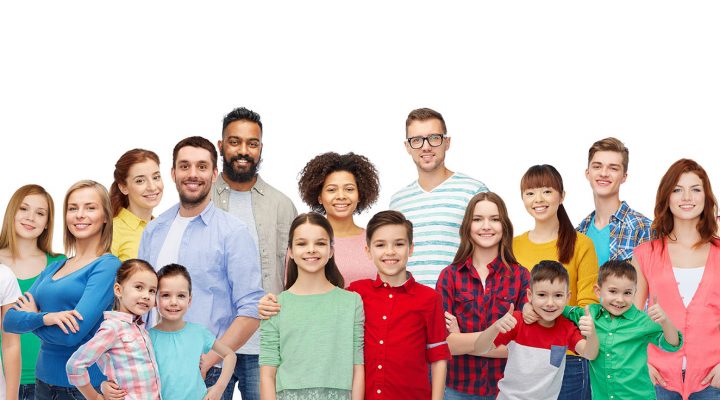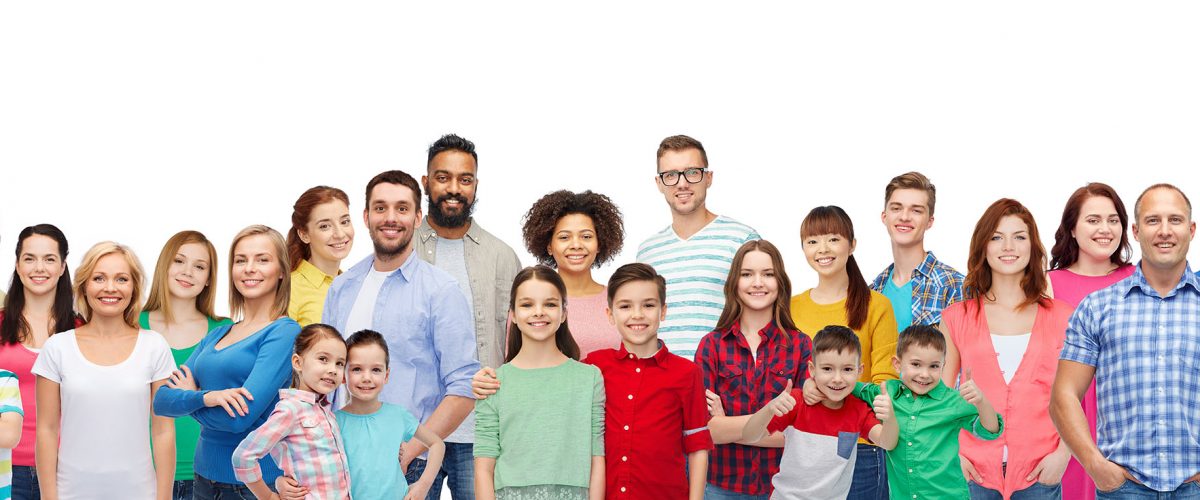What does the idea of “family” mean anymore? According to a new national research, Americans’ ideas of marriage and family are changing and people have mixed feelings about how that will affect the future.
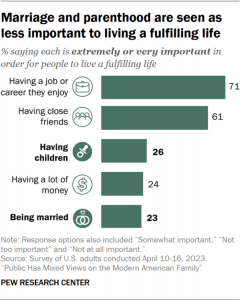 Pew Research Center released a new study of 5,073 American adults from April of this year. It found that while 25% of respondents say they are optimistic about the future of the concept of the family and the institution of marriage in America, 40% report feeling pessimistic about it.
Pew Research Center released a new study of 5,073 American adults from April of this year. It found that while 25% of respondents say they are optimistic about the future of the concept of the family and the institution of marriage in America, 40% report feeling pessimistic about it.
The study found Americans’ values around family and relationships are shifting in multiple ways:
- 11% of respondents say children being raised outside traditional two-parent households is a positive development.
- 15% approve of couples living together without being married.
- 25% support having fewer children.
- 34% approve of delaying marriage until later in life.
While traditional conceptions of marriage and family are still prevalent, societal trends are shifting and having a profound effect on the culture’s perception of what family means, Pew researchers found. Changes in marriage law, fertility rates and social values are shifting the way people live their lives, partner with others and arrange their priorities.
“There’s baseline support for a variety of family arrangements, but the public still favors some types of families over others,” Pew reported. “Families that include a married husband and wife raising children are seen as the most acceptable. At the same time, relatively few Americans say marriage and parenthood are central to living a fulfilling life.”
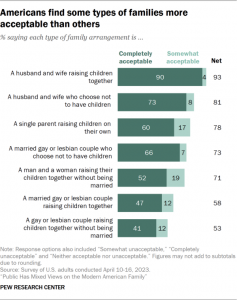 This shift is marked by growing statistics in favor of non-traditional marriage arrangements, single parenthood and out-of-wedlock childrearing. More than half (52%) of respondents approve of a non-married couple choosing to have children, 78% approve of a single parent raising a child alone, 33% support open marriages, 47% support married gay and lesbian couples raising children, and 41% approve of non-married gay and lesbian couples raising children. Another 4% of respondents go as far as to say a traditional marriage of a husband and wife raising children together is unacceptable.
This shift is marked by growing statistics in favor of non-traditional marriage arrangements, single parenthood and out-of-wedlock childrearing. More than half (52%) of respondents approve of a non-married couple choosing to have children, 78% approve of a single parent raising a child alone, 33% support open marriages, 47% support married gay and lesbian couples raising children, and 41% approve of non-married gay and lesbian couples raising children. Another 4% of respondents go as far as to say a traditional marriage of a husband and wife raising children together is unacceptable.
Perceptions of these changes are highly reflected along generational and partisan lines. Older generations and Republicans are far more pessimistic about these changes and are more likely to report that being married is an important part of building a fulfilling life. Younger people and Democrats are far more comfortable about these new arrangements, accepting of LGBTQ relationships and single parents, and optimistic about the future of marriage and family.
Religious views also appear to be taking a backseat in ideal family situations. Pew found 44% of respondents say religion plays a major role in fostering a good family, while 39% view it negatively. This is strongly contrasted with 83% of white evangelical Protestants citing religion as important.
When asked about what is necessary to live a fulfilling life, only a small percentage of respondents reported that having children (26%) and getting married (23%) are important. This has been reflected in overall plummeting birth rates. Survey respondents also say they find greater meaning in their careers (71%) and friendships (61%).
These trends ultimately will shift the course of the U.S. going forward politically, socially and religiously, the Pew report predicts. However, there is still outstanding disagreement among respondents about how it will affect life. Democrats tend to see more positives overall in these changes than Republicans.
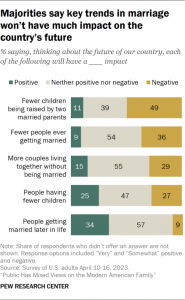 Half (50%) of respondents note they feel positive or neutral on how the decline in traditional two-parent families will affect the future. Slightly fewer (43%) say declining birthrates will have a positive effect on women’s career advancement, and 41% say declining birthrates will benefit the environment. The perceived negative economic effects also are notable, with 41% of respondents fearing lower birthrates negatively affecting Social Security and 36% fearing it will harm the overall economy.
Half (50%) of respondents note they feel positive or neutral on how the decline in traditional two-parent families will affect the future. Slightly fewer (43%) say declining birthrates will have a positive effect on women’s career advancement, and 41% say declining birthrates will benefit the environment. The perceived negative economic effects also are notable, with 41% of respondents fearing lower birthrates negatively affecting Social Security and 36% fearing it will harm the overall economy.
“To be sure, the public is pessimistic about a lot of things these days — not just the family,” the Pew report summarizes. “Majorities say they’re pessimistic about the country’s moral and ethical standards (63%) and its educational system (59%). In addition, the public is more pessimistic than optimistic about the country’s ability to ensure racial equality for all people regardless of their race or ethnicity and its ability to get along with other countries in the world.”

